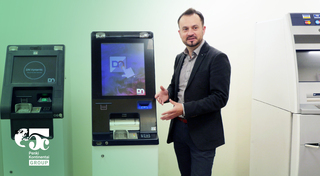The global COVID-19 pandemic has a significant impact on both the habits of society and the banking sector. The World Health Organization recommended avoiding contact with surfaces in public places to decrease the spread of the virus. Banks increased the limit for contactless payments without the PIN.

The global COVID-19 pandemic has a significant impact on both the habits of society and the banking sector. The World Health Organization recommended avoiding contact with surfaces in public places to decrease the spread of the virus. Banks increased the limit for contactless payments without the PIN.
The leading provider of strategic research in banking automation and payments RBR predicts that the COVID-19 pandemic will accelerate the growth of contactless payments. Last year, the number of contactless cards increased by 23% worldwide. In 2020, more than 40% of payment cards in the world support contactless payment. Today the majority of cards issued in our region are contactless.
“Contactless transactions will become more popular in the future. We are talking about not only the contactless POS terminal but also about the contactless ATMs, postal, parking, and other vending machines. The entire infrastructure for client authentication will become contactless over time,” says Kornelijus Šišla, Head of Strategic Partnership at Penkių kontinentų bankinės technologijos (BS/2, which is part of Penki Kontinentai).
How does contactless technology work?
Near Field Communication (NFC) technology is using for contactless payments. It allows devices to exchange data within a radius of up to 10 centimetres. The close and fast connection ensures payment security.
NFC allows customer identification without inserting the card into a POS terminal, ATM, or other devices. This technology is using to get access to various objects (office, metro, etc.), log into a network, launch applications, and other systems.
According to Kornelijus Šišla, NFC could be implemented in smartphones, rings, smartwatches, and tickets. If your device supports NFC, you can use it to pay using POS terminals or ATMs. “Perhaps, in the future, plastic cards will go out of circulation, but contactless payment will remain,” says the expert.
The emergence of contactless ATMs
In the Caucasus region, the first contactless ATMs appeared six years ago in Georgian banks. The Lithuanian banking technology company BS/2 has been making a significant contribution to the introduction of this technology into a self-service banking channel.
In 2016, US credit institutions began to use contactless ATMs actively.
In the Baltic States, the first contactless ATMs appeared in Estonia in 2017 and a year later in Latvia. The coronavirus pandemic triggered the introduction of this technology in Lithuania this summer.
According to research, the number of contactless ATMs in 2019 increased by 83%. The COVID-19 threat will accelerate the widespread use of this technology, which has already begun.